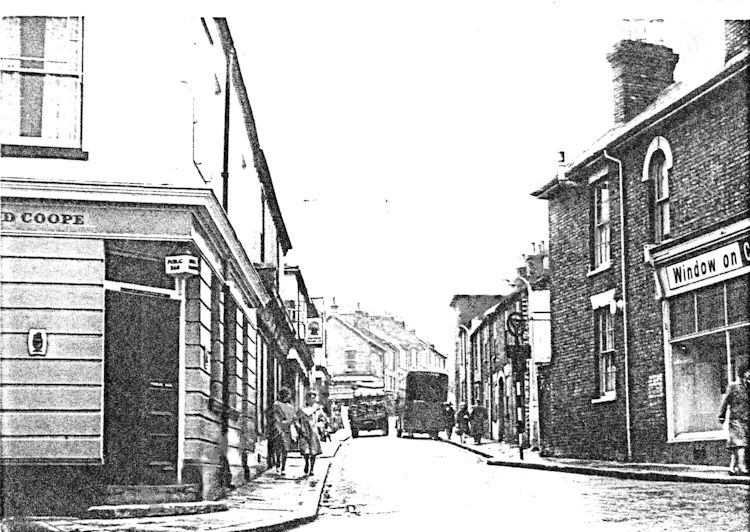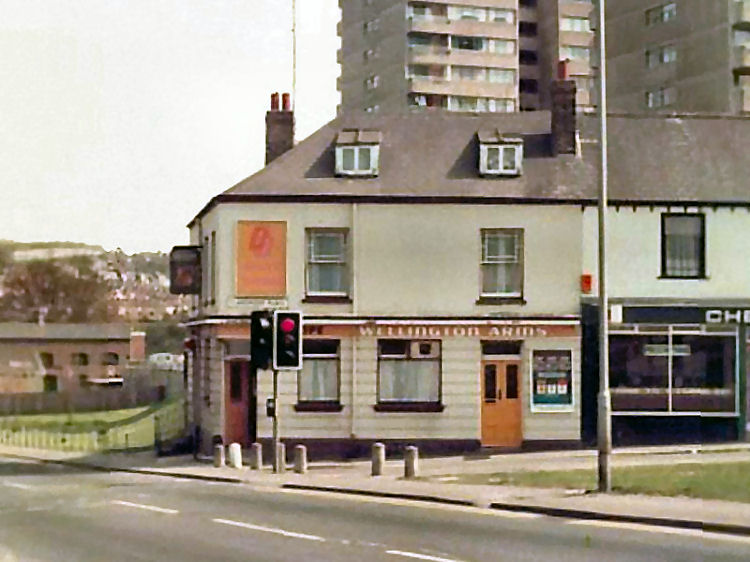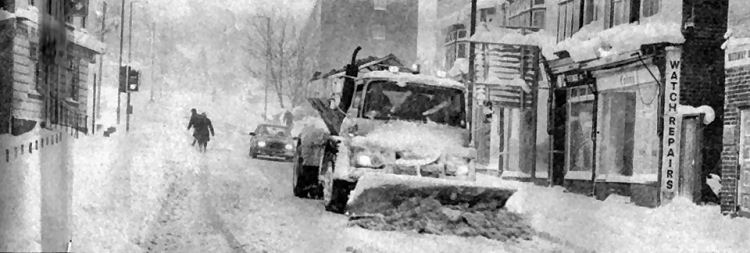|
124 New Road (New Road Gate 1828)
Chatham

Above photo, 1957. |

Above photo, circa 1980s, kindly sent by Tony Smith. |

Above photo, 1987, just showing the pub on the left. |

Above photo showing the rough location 2024. |
The Licensing
Records of 1872 stated the premises held a Full License and was owned by
Edward Winch of Chatham.
|
From the Kentish Gazette 3 April 1838.
A distressing accident, attended with lots of life, occurred in
Chatham Dock Yard on Thursday afternoon last, between two and three
o’clock. A shipwright named William Fayar, was employed with others
on the Tribune in the Stone Dock, and in walking across some planks
laid at the side of the vessel for the assistance of the men at
work, he tripped over a piece of wood, and was pitched head foremost
into the Stone Dock. His skull was fractured, and his body much
bruised. The poor fellow lived only about five minutes after he had
been conveyed to his residence, Prospect-place, New-road. A
coroner’s inquest was held on the body at the sign of the
"Wellington," on Saturday last, before R. Hinde, Esq. when a verdict
of Accidental Death was returned. The deceased has left a widow and
five children to lament their loss. We understand the man bore a
very excellent character.
|
|
From the Kentish Gazette 20 November 1838.
ROCHESTER, CHATHAM, &c.
On Wednesday last a coroner’s inquest was held in Strood before R.
Hinde, Esq. coroner, touching the death of Mrs. Anne Boreman, widow
of Mr. Boreman, who hung himself about four months since at the back
of his own residence. From the evidence it appeared that the
deceased, whose age was 60 years, walked into the garden, and on
returning she fell down and instantly expired.
Verdict "Died by the Visitation of God."
On the same day the coroner held another inquest at the "Wellington
Arms," New-road, on the body of a female aged 53 years, who had died
suddenly the previous day at her house, No. 3, Claremont-place,
Chatham. Rebecca Hillyer stated that the deceased went to her house
between the hours of eleven and twelve, with some linen on a tray to
mangle, which occupied her a few moments in doing. The deceased was
talking with the witness, and upon her going towards the door to
return, she exclaimed "I cannot talk," and immediately sat herself
down in a chair, and fell into a violent fit. Witness lost not a
moment in sending for a neighbour, Mr. Crawford, who quickly
attended. They both laid the deceased on the ground, and with some
warm water washed the deceased’s hands and limbs, but she did not
revive. Doctor Martin happening to pass, was called in, and he bled
her, and desired that she should be removed to her home, where she
died. Deceased was a married woman; her husband is a carpenter
belonging to the Ordnance, and his name is Robert Pilcher. The jury
instantly pronounced a verdict of "Died of Apoplexy."
The same coroner held another inquest afterwards at Melville
Hospital, on the body of a lad named Lindzee, belonging to the ship
Caracoa, who was drowned on the previous Saturday. It appeared that
at the time of the accident, the deceased was in the act of hauling
a boat alongside the vessel, when it is supposed that his foot
slipped, and he was thrown into the water. The body was picked up
about one hour afterwards.
Verdict:— "Accidentally Drowned."
|
|
From the Kentish Gazette, 26 December 1848.
On Wednesday evening, a coroner’s jury was empanelled at the
"Wellington," for the purpose of inquiring how, or by what means, George
James Pook came by his death. The coroner, J. Hinde, Esq., after the
jury had taken a view of the body, proceeded to take the evidence of the
witnesses in attendance. The first was John Castleton, who described the
finding of the body.
James Wood examined, said, I am a policeman belonging to the dockyard.
On Monday night last, about 20 minutes to 11 o’clock, John Castleton
called me up. I went with him to the end of the new wall of the
Dock-yard. I saw the body of a man lying in the horse road, he groaned
three times, and was insensible. I saw a pool of blood in the footpath,
which was near to him, and a hat was close against the wall. Castleton
picked up a pistol, and I told him he had better let it lay until some
other persons came. I went for a constable, and Mr. Weekes, and the
constable returned with me. I found other persons there, and when the
surgeon came be pronounced the man dead; and Mr. Castleton fetched his
master's horse and cart, and removed the deceased in it up to the house.
Mr. Henry Weekes, surgeon, stated that he raised the body up, and laid
it against the bank, and examined it; he found a pistol wound in the
left side, just below the heart; the ball had passed through the ninth
rib. The size of the wound was sufficiently large to admit his two
fingers, and quite sufficient to cause death. He saw a large pool of
blood on the pathway near the spot.
The Coroner ordered the pistol to be produced. It was a pocket pistol
with percussion lock.
Mr. Weekes then continued.— The deceased he had removed to this house,
and the papers found on his person enabled him to apprise his friends of
what had taken place. From the deceased's pockets he took seven small
pebbles, a powder flask containing powder, some percussion caps, gloves,
and other things; also one or two letters from his mother, who resides
in Park-place, Gillingham. One related to a certain young lady. A lock
of hair was also found, and a picture containing two figures,
representing a man having shot a female, who appears to be falling, and
underneath was written, "All for love." Mr. Weekes said he had no doubt
but that the deceased shot himself. He had attended his family, and the
deceased had latterly laboured under much excitement, produced, no
doubt, from his love disappointment.
Several of the jury expressed a wish to hear the evidence of Mr. Sibun,
who was in attendance. He said he was an inspector of shipwrights in
Chatham dockyard, and resided near to the ferry-house Tom-all-alone. The
deceased he had seen at his house on Monday night. Himself and family
went to bed about a quarter past ten o'clock, and shortly after he was
alarmed by his neighbour, Mr. Taylor, being called up by Castleton. He
called his son Edward. He saw the body lying in the road. He did not
know the man then. He was apparently dead. He stayed about ten minutes,
and went away without knowing who it was. About an hour and a half
afterwards Mr. Weekes called at his house, and asked him if he knew a
young man named Pook? He replied in the affirmative, and added that he
had paid his addresses to his daughter, and he (witness) had objected to
it, and requested his daughter to forbid him the house. That was about a
fortnight ago. The young man was at his house about three weeks since.
He did not know the mother or any of the family belonging to the
deceased.
The jury and coroner expressed their satisfaction with the evidence of
Mr. Sibun, as did also the deceased’s relatives.
Edward Sibun, the son of the last witness, gave similar evidence.
Mr. G. W. Kennett, of the "Golden Lion Inn," Brompton, deposed to the
deceased's having drank a glass of rum with a Marine at his house on
Saturday. He insisted upon having it, although in such a state of
intoxication that they put him to bed. He had a pistol with him, which
witness, in vain, wished him to leave.
James White, a butcher, at New Brompton, saw the deceased on Sunday
morning on the Lines at Chatham with a pistol, which he was ramming with
a walking-stick. He appeared strange and excited.
Wm. Neal Lansley, brother-in-law of the deceased, spoke to the strange
conduct of the deceased. About six mouths ago he attempted to poison
himself in consequence of a disappointment similar to the present, but
the poison was taken from his stomach by the stomach-pump, and he was
restored.
There being no other evidence, the coroner summed up, and the jury
unanimously returned a verdict:— "That the deceased shot himself with a
pistol, he being at the time in a state of great mental excitement.”
|
|
Southeastern Gazette, 2 August 1853.
COMPACT PUBLIC-HOUSE,
(Unknown)
TO BE DISPOSED OF,
In the town of Sheerness, Isle of Sheppey; coming-in not more than
£50.
MR. G. TYE has been instructed to procure a purchaser for this very
desirable old-established PUBLIC-HOUSE, consisting of bar, three
parlours, taproom, seven bed-rooms, kitchen, cellar, yard, and large
garden. Rent £35 per year. The above stands away from any other in
the same line by 200 yards and in a good neighbourhood.
Apply at the "Wellington Inn," New-road, Chatham, Kent.
|
|
From the Southeastern Gazette, 1 May 1866.
Preliminary Notice of Sale.
Messrs. COBB HAVE received instruction from the Executors of the late
Mr. Joseph Ashley, to SELL by AUCTION, in the month of June, at the “Sun
Hotel,” Chatham.
The valuable FREEHOLD and LEASEHOLD PUBLIC-HOUSES, BEER-HOUSES, TRADE
PREMISES, DWELLING HOUSES, &o., viz;-
The "Cock" Public-house, in the
High-street, Rochester, with shop adjoining, and cottages and garden in
the rear.
The "White Lion," High-street, Chatham.
The "Wellington," on the New-road, Chatham.
The "Hen and Chickens," Luton, Chatham.
The "Hook and Hatchet," Chatham.
The "Three Brothers," Slicketts-hill, Chatham.
The "Prince of
Wales," Hards Town, Gillingham.
The "Lord Nelson," Brompton, Chatham.
The "Plough and Chequers," Gillingham.
The "Red Lion," Snodland.
The "White Horse," and land (at Poundgate), in the parish of Laddesdown.
The Residence of the late Mr. Ashley, with spacious trade premises, in
the High-street, Chatham. Also, an improved Rent on Leasehold Property
adjoining. The Dwelling-house, No. 24, Gibraltar-place, Chatham.
Two Houses adjoining the Luton-road, called St. Leonard’s Ville. Nos. 1,
3, 5, and 6, Bethesda-place, Henry-street, Chatham. Nos. 1 and 2,
Providence-place, Henry-street, Chatham. Nos. 24, 52, and 53,
Henry-street, Chatham. Nos. 8, 40, and 41, Newnham-street, Chatham.
Leasehold Shop and Dwelling-house, adjoining the “Wellington” Public-
house, New-road, Chatham.
SHEERNESS AND ISLE OF SHEPPEY.
The "White Swan," High-street, Blue Town, Sheerness.
The "Crooked
Billet," Eastchurch.
Further notice as to time, &c., of sale will shortly issued.
Particulars in the meantime may be obtained of Messrs Acworth and Sons,
Solicitors, Star-hill, Rochester; of Messrs. Morris, Stone, Townson and
Morris, Solicitors, Moorgate-street Chambers, London; and of Messrs,
Cobb, Surveyors and Land Agents, 26, Lincoln s Inn-fields, London, and
Rochester, Kent.
|
|
From the Maidstone and Kentish Journal, Monday, 28 May, 1866.
PRELIMINARY NOTICE OF SALE.
Messrs. Cobb have received instructions from the Executors of the late Mr.
Joseph Ashley, to sell by auction, in the month of June, at the "Sun Hotel,"
Chatham.
The Valuable Freehold and Leasehold Public Houses, Beer Houses, Trade
Premises, Dwelling Houses, &c., viz:-
The "Wellington," on the new road, Chatham.
....
Further notice as to time, &c., of sale, will shortly be issued.
Particulars in the meantime may be obtained of Messrs. Acworth and Son,
Solicitors, Star Hill, Rochester; of Messrs. Morris, Stone, Townson, and
Morris, solicitors, Moorgate Street Chambers, Moorgate Street; and of
Messrs. Cobb, surveyors and land agents, 26, Lincoln's-inn-fields, London,
and Rochester, Kent.
|
I am informed that the pub was demolished in the 1980s to make way for
the road widening scheme.
|
From an email received 30 September 2022.
Interested to see your article on my old home.
We lived in Strood and in 1941 my father was called up into the
Army and my mother was given the option of evacuating but instead
she chose to go and live with her parents---Bill & Ada Wood at the
Wellington Arms, Chatham.
I remember that the Draymen with their ‘horse and cart’ would
deliver the barrels of beer which came down a ramp into the cellar,
through a trap door in the pavement of the side road. Being 4 or 5
at the time I recall my mother making me a green apron—to match
those worn by the brewers (and I would wear my apron and help the
brewers when they where delivering).
The other memory I have is a large trailer being parked at the
front (similar to a modern Container) it was all black with a large
Chimney----- when news that the Hun where coming the vast boiler in
the trailer would be ignited and it would produce dense black
smoke--- This was part of ‘The Blackout’ to confuse the German
aircraft bombing the Dockyard.
For my sins I was an Honary Freeman of the City of
Rochester----until Rochester, after 780 years ceased to be a City in
1998.
William N Hodshon. |
LICENSEE LIST
JACKSON Charles 1828-32+
 
CRONEEN Daniel 1858-62+
POTTS Robert 1872-91+(widow age 55 in 1881 ) )

HYLANDS Lewis Henry 1903+

FULCHER Robert 1913+
WELLS George C 1922+
MARSH Charles H 1930+
KING William 1938+
WOOD Bill & Ada 1941+
ROBERTS Walter 1955+
https://pubwiki.co.uk/WellingtonArms.shtml
 From the Pigot's Directory 1828-29 From the Pigot's Directory 1828-29
 From the Pigot's Directory 1832-33-34 From the Pigot's Directory 1832-33-34
 From the Kelly's Directory 1903 From the Kelly's Directory 1903
 Licensing
Records 1872 Licensing
Records 1872
 Census Census
|



